This post may contain affiliate links. Please read my disclosure and privacy policy.
I’m embarrassed to admit it, but for years I struggled with binge eating. When others were around me, I would eat healthy, normal-looking meals.
But, when I was by myself, I would gorge on junk food until I felt sick. It was a heavy secret to keep, affecting not only my weight and overall health but also my social life and relationships.
(Some nights I would rather stay home and secretly eat than hang out with my family or friends.)
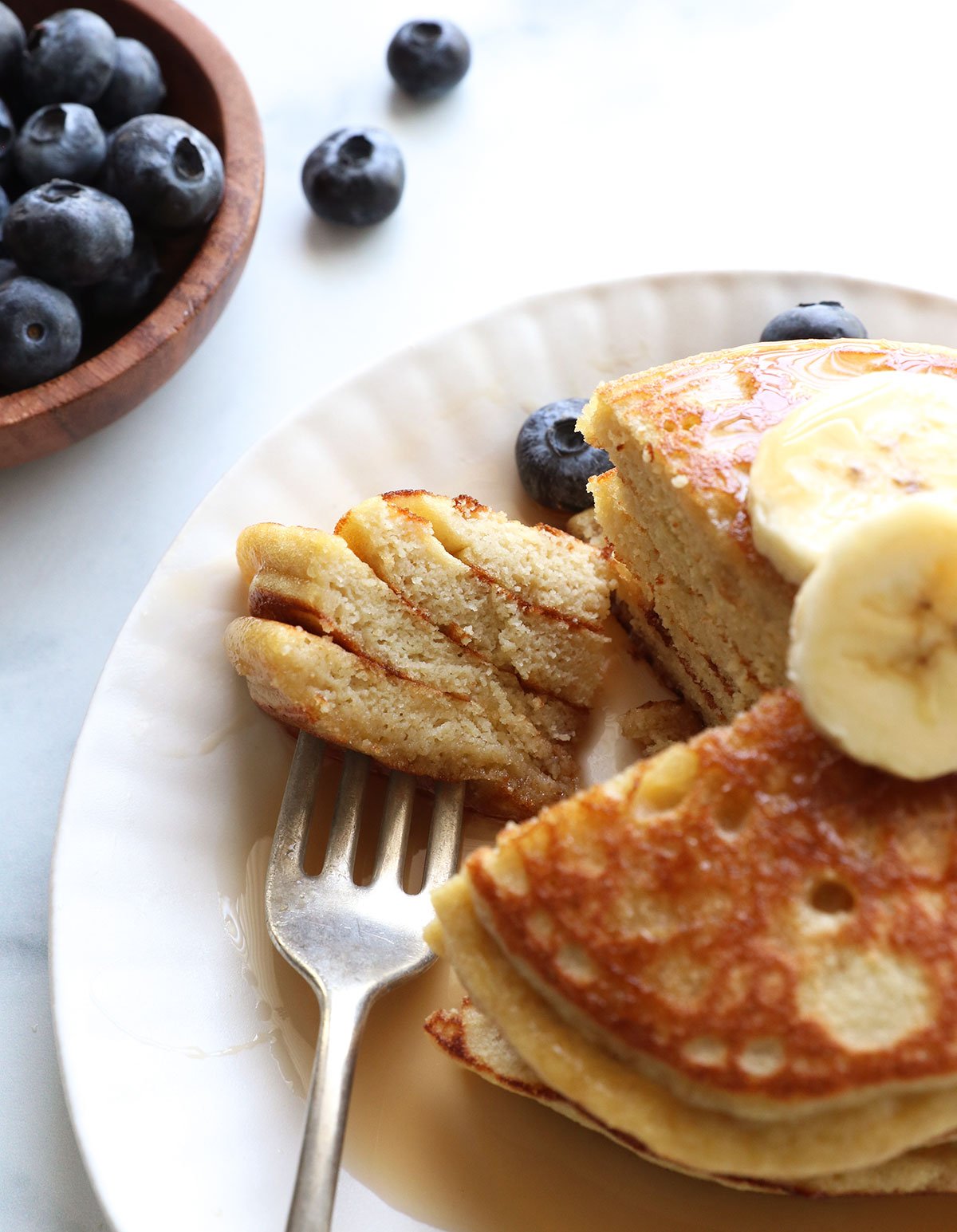
Today I want to share some of the steps I took to finally stop binge eating, in the hopes that it might help someone else out there who might be struggling, too.
Disclaimer: If you are feeling suicidal, severely depressed, or in need of medical attention, please see a licensed healthcare provider. This website is not intended to be a substitute for medical advice.
What Causes Binge Eating?
I don’t believe there is just one answer as to what causes people to start binge eating, but it seems that one common cause is having a restricted diet at some point in your life.
This could have happened when you were a child, if well-meaning parents attempted to limit your food intake to help prevent childhood obesity, or it might have happened later in life when you attempted to diet to lose weight.
(In my case, it was the latter.)
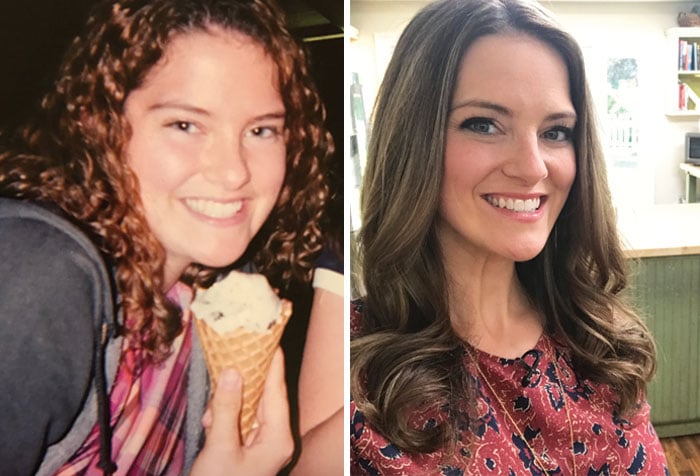
Not surprisingly, depression can also play a role in binge eating. My suffering hit its peak when I was working from home in Los Angeles, as I felt very isolated and didn’t have a lot of human interaction each day.
I also had a nutritionally poor diet, which probably contributed to those feelings of depression, and that left me feeling malnourished. This combination led to more serious bouts of binge eating as you’ll see below.
What is Considered Binge Eating?
Binge eating is defined as the consumption of a large quantity of food in a short period of time.
In many cases, the person binge eating feels out of control and eats WAY past their comfort level. For a person suffering from Binge Eating Disorder, there is no purging after the binge (which is what makes it different from Bulimia.)
I would imagine that almost everyone has experienced some level of emotional eating, or comfort eating, at some point in his or her life, but it’s the eating far past your comfort level or feeling out of control that sets binge eating apart from simply “splurging.”
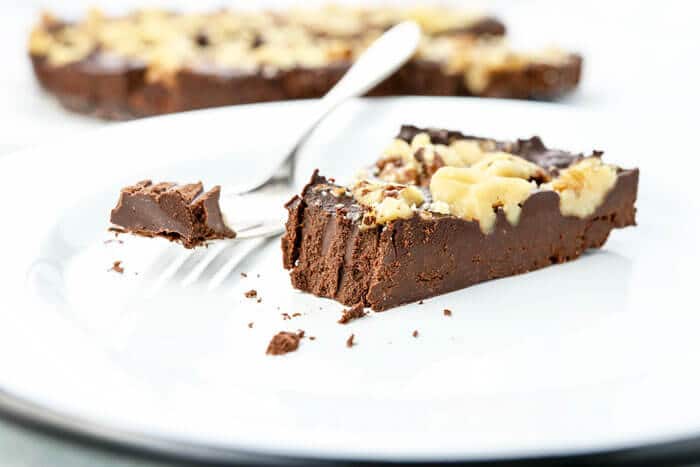
A binge can vary from person to person, as it’s kind of up to self-interpretation. For some, they may tend to binge eat at night, after a stressful day at work, or after a day of a low-calorie dieting.
For others, it may be a full day of binge eating, particularly on days leading up to starting a strict diet. One thing that most binges have in common is that the eating is done in secret, as the person is ashamed of his or her actions.
Here’s an example of what a full day of secret binge eating looked like for me:
- Morning: I’d go to McDonald’s and order an Extra Value Meal (which included a breakfast biscuit and hash browns), then realize that I could even be more indulgent and order a second meal. I’d order two cinnamon rolls, as well, because why not? I took my massive amount of food home and devoured it all in about 15-20 minutes. After that I would feel slightly guilty, but still excited to eat more food.
- Afternoon: I’d order a large, deep-dish pizza. While I was waiting for it to be delivered, I’d eat cookies and potato chips, and anything else that might might be off-limits to me in the near future.
- Early Evening: This was often my last chance to eat something before someone else could get home and interrupt my secret eating, so I’d walk to the convenience store across the street and buy a pint of ice cream, or a king-size candy bar, or both. I’d eat as much as I could, then I’d get rid of ALL of the evidence, taking out the trash so that no one would see my empty food wrappers.
- Evening: I’d make myself a light salad or healthy dinner to eat in front of my family, and act as if my stomach wasn’t killing me, even though I felt miserable. I’d go to bed feeling guilty, depressed, and ashamed, with a resolution to eat “perfectly” the next day.
A binge day like this would usually occur anytime that I was planning to try a super-strict diet, like a juice fast, an all-raw diet, a candida cleanse, or a low-carb protocol (I tried it all!).
The more strict my diet, the more drastic the binge would be.
Also, my binges rarely were contained to just one day. Usually, I would binge-eat like that one to three times a week. If I slipped up during a dieting day, the rest of that day would turn into a binge because the way I saw it, I had already “blown it” for the day and I might as well start fresh tomorrow.
Mentally, I remember reasoning with myself that I would have a better “before” picture to compare to later when I lost weight after my diet since I’d be so bloated from binge-eating. (What a great excuse to eat with reckless abandon!)
The only problem was… it was really hard to stop binge eating, and it was even harder to stick to a strict diet for very long.
On a side note, days like this one would also wreak havoc on my budget. I was too ashamed to keep these “bad” foods in my fridge, so I would buy them and discard the evidence, which is a huge waste across the board. You would think that being on a tight budget would have stopped me at the time, but it didn’t.
Binge eating, in general, doesn’t make logical sense, which is why it’s so hard to explain it to others who haven’t experienced it.
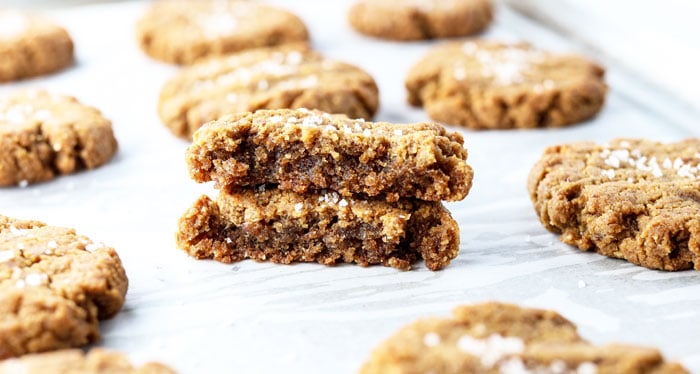
Stuck In A Cycle of Yo-Yo Dieting
I suffered through this cycle for years because I was always convinced that if I could just find the perfect diet, or reach a certain goal weight or clothing size, that my issues would go away.
I wouldn’t stop dieting, and therefore I couldn’t stop binge eating, either.
I also felt like I was “getting away with it” because I never gained THAT much weight, despite my crazy eating habits. I definitely did gain weight, and my clothing size did fluctuate often, but I would always follow a super-strict diet for 2 to 4 weeks and lose the weight again. (Though, this did get harder to maintain over time. Your body won’t always respond as well to the same diet over and over again.)
Then the cycle would start all over again. I was stuck in a cycle of yo-yo dieting.

How I Finally Stopped Binge Eating
I’d love to say there was a “magic cure” that made things click, but it didn’t happen overnight.
For me, the change was more gradual.
By taking the steps below, my binge eating sessions became shorter, less severe, and happened far less frequently. Eventually, they started to simply resemble the dietary “splurges” that normal people have. (Like having a couple of cookies after family dinner, or going out for ice cream with friends.) Now, I eat like a healthy, normal person with a few splurges here and there.
The following things helped me get there:
- I stopped dieting. This was a non-negotiable step for me. I had to stop restricting my food choices because restriction led me to binge eating. Every. Single. Time. No more calorie counting or thinking about macronutrients for me. In fact, I needed to make sure I was eating plenty of nourishing food so that my body didn’t feel restricted at all. When you eat enough, your cravings will eventually diminish naturally. (This is also why I urge people to enjoy plenty of fresh fruit— when I eat fruit, I have almost no sugar cravings.)
- I stopped labeling foods as “good” or “bad.” This one is tricky because I truly do believe that some foods are better and more nutritious than others. I think we should primarily focus on eating real, whole foods as much as possible, and I do think that processed foods should be minimized. However, for the sake of my mental health, I don’t feel guilty about moments when I want to eat french fries, pizza, or a real donut. It really is okay to eat these things now and then! When I don’t feel guilty about it, I go right back to eating salads, smoothies, and healthy dinners– usually appreciating how good they make me feel even more. I try to practice this mentality with my kids, too, so they hopefully won’t grow up with issues around food.
- I dropped all of my dietary labels. Along the same lines, I also decided to stop calling myself a vegetarian, because it was not doing me any favors from a mental health perspective. I needed to be allowed to eat any food I wanted, including meat. For the most part, I still don’t like to eat meat– but every now and then I want to be able to have a cheeseburger, or slice of pepperoni pizza, or a bowl of chicken soup, without feeling guilty about it. (Had I become a vegetarian for strong ethical reasons, I don’t think this would have been as much of an issue, but I became a vegetarian primarily because I wasn’t that fond of meat and I thought I’d be leaner.)
- I started practicing daily self-care. Have you heard the phrase, “Fake it until you make it?” Even if you’re not totally happy with how your body looks or feels, you have to start acting like you LOVE it. With enough practice, you will! To get started, I made a list of things that make me feel good– like dry skin brushing, sitting in a sauna, going for a walk outdoors, or even taking a nap– and then I tried to practice one or more of those things daily. I’ve found that the more I take care of myself, the more I want to keep it up. It’s momentum-building! (As a bonus, taking a walk outside makes me feel better than eating a whole sleeve of cookies.)
- I only eat food that I truly love. I think it’s really important to start noticing how foods make you feel and what you love the taste of. When I stopped dieting, I let myself eat anything and everything– including fast food and junk food. And you know what I realized? Most of that junk food appealed to me because I had made it “forbidden.” When you tell yourself you can’t have something, you make that very thing SO MUCH MORE tempting. When I stopped making certain foods forbidden, I had the opportunity to judge those foods based on their actual taste and texture. Not surprisingly, most of the packaged junk food and fast food options became unappealing, simply because the recipes I make at home do taste better– so now I choose homemade food most of the time because I prefer it. (Not because I feel like I have to.)
Seek Professional Counseling: I was too embarrassed (and broke) to seek professional help at the time, but I still wish I could have seen a counselor for help. I’d recommend anyone who is struggling with binge eating, or another eating disorder, to seek help as soon as possible. I think it would have saved me a lot of time and struggle to have a professional guide me through the recovery process since none of my friends or family could relate to what I was going through.
As an alternative, I did read a lot of books. I can’t say that one book in particular gave me an “a-ha moment,” but I do think that as a whole, they helped gradually change my mindset. Here are a few of the books I found helpful.
Can you stop binge eating AND lose weight?
I think the scariest part of this whole process was the fact that I had to stop dieting in order to stop binge eating. It’s scary to stop dieting because I think everyone assumes that they might gain weight when they let themselves eat whatever they want. (And often the desire to lose weight is what starts this cycle in the first place.)
The truth is, you might gain a couple of pounds when you first allow yourself to eat whatever you want… though, that wasn’t the case for me.
Because I truly let myself eat whatever I wanted, whenever I wanted, I was also able to stop eating those items when I was no longer enjoying them. Forbidden foods lose their appeal when you truly allow yourself to have them anytime.
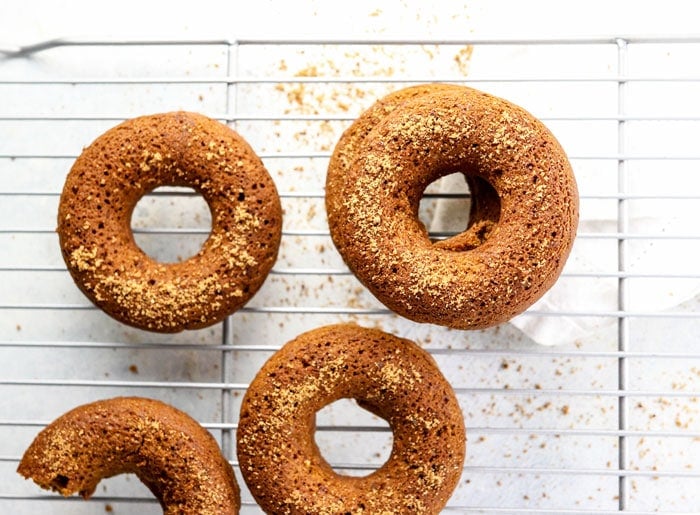
For example, when I was dieting and binge eating, I could have eaten a whole sleeve or two of cookies in one day because I knew I wouldn’t be “allowed” to eat them the next day. I ate more than I needed or even wanted to, simply because they were going to be forbidden to me soon.
When I gave myself permission to eat those cookies whenever I wanted, I would only eat 2 or 3 cookies at a time and then I’d save the rest for the next time I wanted them. Eventually the box could sit in my pantry for a whole month or more.
I became one of those people who “forgot” that the cookies were even there. (Which certainly never happened to me before!)
Get Rid of the “All or Nothing” Mentality
Something that I preach here on the blog, as well as in my cookbooks, is that you have to get rid of the “all or nothing” mentality if you want to have a healthy relationship with food.
At the peak of my binge eating, I was either on a diet or I wasn’t– so when I wasn’t dieting, I was binge eating. There was no middle ground.
Now, I try to abide by the popular 80/20 approach, where I eat healthy 80% of the time, but I still splurge 20% of the time with no guilt whatsoever. Despite my lack of dieting, my body naturally lost the excess weight I was carrying– simply because I wasn’t binge eating anymore! I had to trust the process and trust that my body would naturally start craving what it needed when I simply followed my hunger signals. I eat when I’m hungry, and when I start to feel full, I stop. I can always go back for more food if I need it, so there’s no urge to stuff my face all at once.
While it’s super-embarrassing to share my struggles here in such a public space (Hi, Mom! Hello, coworkers!), I hope that my experience will help at least one other person who is out there struggling, too.
If you have any questions, please feel free to ask them in the comments below and I’ll do my best to answer them.
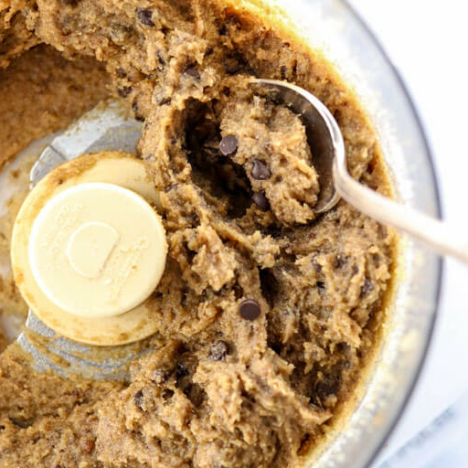

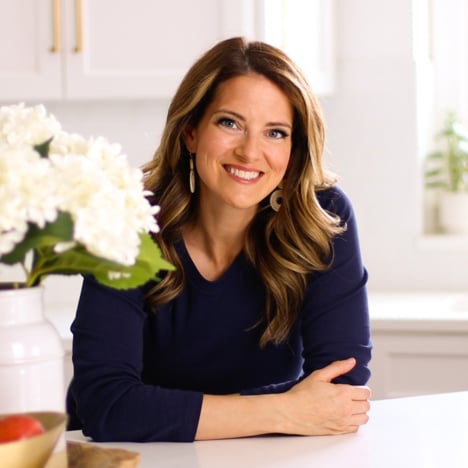
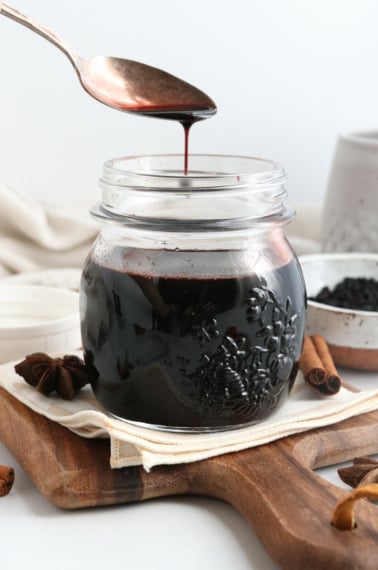

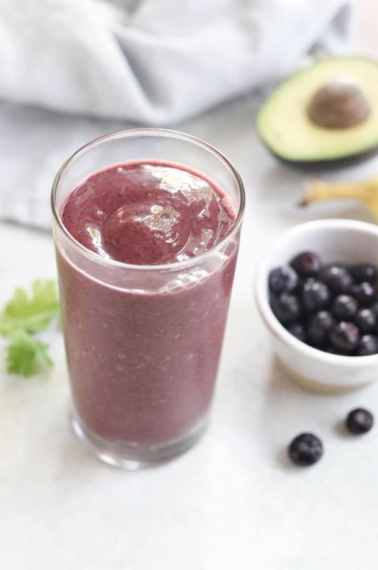
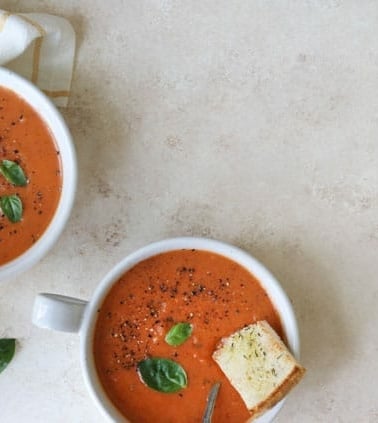






Thank you for your candid account. I’m in tears here, I feel like I’m not alone, and I’m not a bad greedy person. I live in hope of coming out of this phase of my life in the same positive healthy way you have. Thank you.
I literally am in tears here. THANK YOU for your honesty, it was like you were describing me. I live in hope of coming out of the other side. Thank you.
Hey!
Thanks so much for sharing
I am sure you will help a lot of people that way…
And there is something I myself wanted to ask since you mentioned that parents could possibly push their child into that direction.
My girl will turn 3 soon and she has what we think a huge appetite but I am concerned by her behavior toward food.
She often eats more than my husband or I if we don’t stop her.
We believe her portion are healthy for her size and age.
She is vegan and I make sure she is offered plenty of varied food
but she always asks for more or go to the fridge during the day or she thinks of what she is going to have next before she even finished her plate for e.g.
What are your thoughts on that?
Just for information our daughter was breast fed until 2 and was having as much food as she wanted when she was self weaning as we believed she would know when she was full (but this does NOT seem to apply anymore ..)
Hope you can help me on that one.
Thank you very much
Have you considered that your daughter may be missing something in her diet. She may be seeking what she’s missing by eating more. You may want to consider adding free range eggs or raw milk to see if it helps. While a vegan diet may work for you and your husband, your daughter’s biology may be different.
All parents who have concerns about what their children or eating or how much should read Ellyn Satter’s book. She is a researcher and is right on the ball with kids and eating.
Wow. This is literally me to a T. I almost want to cry, I didn’t know anyone else did this. I eat and eat and eat and dispose of the remains before my husband gets home and then we eat a smoothie or salad. I’m a raw vegan or I eat an entire box of Oreos.. I never knew this could be considered an eating disorder…
Before my husband and I were married we would only see each other on the weekends. I would only eat fruit and vegetables (literally) all week so we could eat junk together on the weekend.
I know you don’t care about this but I’m just kind of realizing that this is a real problem and not just my problem!!
I’m going to look into those books you mentioned and I’m actually in the middle of cleaning out my pantry right now.
.
Point is, thank you for sharing. I think this was sent from heaven.
Wonderful post, Megan! Thank you for sharing such a personal struggle. I’ve been a fan of yours for many years. I was wondering how you manage self care now as a mom of young children. I have a three year old daughter and a full time job, I find that it’s much harder for me to find non-food ways to treat myself since my personal time is almost non-existent now. I try to enjoy bubble baths together and things like that, but it’s usually more work with a toddler than it is relaxation for me. I know you’re busy too, what do you do these days?
Thanks so much for writing this! I’ve struggled with binge eating since college and I find that it always comes along with a feeling of lack of control over other aspects of my life. I remember going to McDonald’s or Burger King for an “afternoon meal” in college, as in a full on value meal for a snack. My roommates had no idea, I ate normally in front of them! I still struggle with this as an adult, although it will be for much shorter periods of time. Thanks again for sharing.
thank you for writing this article. As someone who suffers from Bulimia Nervosa it is an unintended consequence of “eating clean” constantly which in itself is an eating disorder. We all want to be healthy, but it becomes unhealthy when we group foods into good and bad categories. That’s when it can all start to unravel. Instead why not put foods in “good” and “on a special occasion” category? It’s something that takes a long time to learn and even longer to break the habit. I still can’t have cereal, bread, cookies or even dates and raisins in my house because I’d binge on it. But it’s a learning process but i’m glad there are others out there to support you.
I love your idea of putting foods into the categories of good and on special occasion. I teach elementary school and a unit I had to teach this fall about about nutrition. Having just started to eat more healthy and go to the gym I love this unit but still struggled with the labels of “healthy” and “unhealthy”. Next time this unit rolls around I will use the titles “healthy” and “special occasions”
Thank you for writing such a personal story. I’m reading this in tears, recognizing myself. I hide in my pantry eating as much food as possible before my four year old or husband can see me. I am guilty of restrictive dieting and suffer from the idea that if I don’t eat, even if I’m not hungry, I’ll become ill again – like I did in high school over 25 years ago. This post is so helpful, I “know” most of your advice – but reading about someone else so candid about it makes it settle in – if that make sense. Again, thank you
Thank you so much, Megan. I can relate and have shared these struggles for as long as I can remember, and I’m 46. I want a healthy perspective and don’t want to pass my issues on to my girls. I am grateful for your bravery, honesty, openness, and the fact that your story has led you to this work. It truly helps.
I had severe, life-altering bulimia (off and on) for decades, and truly thought it was a matter of (lack of) willpower, (lack of) mind over matter. The turning point for me was eliminating STEVIA. I had been using Stevia (In the white powder form) for years after switching from Splenda, after switching from Sweet and Low, as Stevia was supposed to be healthy, natural, etc. My need to binge literally disappeared overnight. It truly felt like a miracle, and showed me that it’s NOT just a matter of getting your mind ‘right’; body biochemistry MATTERS. And BTW, Megan, it was your post on stopping Stevia that was the impetus. It was very hard to give up Stevia, even knowing its effect on me, but it was so worth it. I offer this in the hope that it may help someone else struggling.
Betsy,did you switch to a different sweetner or eliminate it?
I’ve never heard about this … I switched to Stevia when I started Keto two years ago. Stevia’s made you binge more, you’ve found?